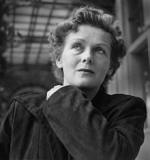Disable ads!
Elisabeth Schwarzkopf
In 1933, shortly after the Nazis came to power, Elisabeth Schwarzkopf's father, a local school headmaster, was dismissed from his position by the new ruling authorities for having refused to allow a Nazi party meeting at his school. He was also banned from taking any new teaching post. Until Friedrich Schwarzkopf's dismissal, the probability was that the 17-year-old Elisabeth would have studied medicine after passing her Abitur; but now, as the daughter of a banned schoolteacher, she was not allowed to enter university and she commenced music studies at the Berlin Hochschule für Musik. Schwarzkopf made her professional debut at the Deutsche Oper Berlin (then called Deutsches Opernhaus) on 15 April 1938, as the Second Flower Maiden (First Group) in act 2 of Richard Wagner's Parsifal. In 1940 Schwarzkopf was awarded a full contract with the Deutsches Opernhaus, a condition of which was that she had to join the Nazi party. Since the theme was brought up in the dissertation of the Austrian historian Oliver Rathkolb in 1982, the discussion of Schwarzkopf's relationship with the Nazi Party has been discussed repeatedly in the media and in literature. There was criticism that Schwarzkopf, not only in the years immediately after the war but also in confrontation with revelations made in the 1980s and 1990s made contradictory statements, including in regard to her membership in the NSDAP (Member No. 7,548,960). At first, she denied this and then with varying explanations defended it. In one version, for example, she claimed that she joined the party only at the insistence of her father who, himself, had earlier lost his position as school principal after forbidding a Nazi program in the school.[citation needed] Further publications discussed her musical performances during the war before Nazi party conferences and for units of the Waffen-SS. Her defenders argue in favor of her claim that she always strictly separated art from politics and that she was a non-political person. In 1942, she was invited to sing with the Vienna State Opera, where her roles included Konstanze in Mozart's Die Entführung aus dem Serail, Musetta and later Mimì in Puccini's La bohème and Violetta in Verdi's La traviata.
 Read more on wikipedia.org Read more on wikipedia.org
 All quotes by Elisabeth Schwarzkopf All quotes by Elisabeth Schwarzkopf
 Edit Edit
|

|
|
|
|
|
Background photo by Giuliana
|